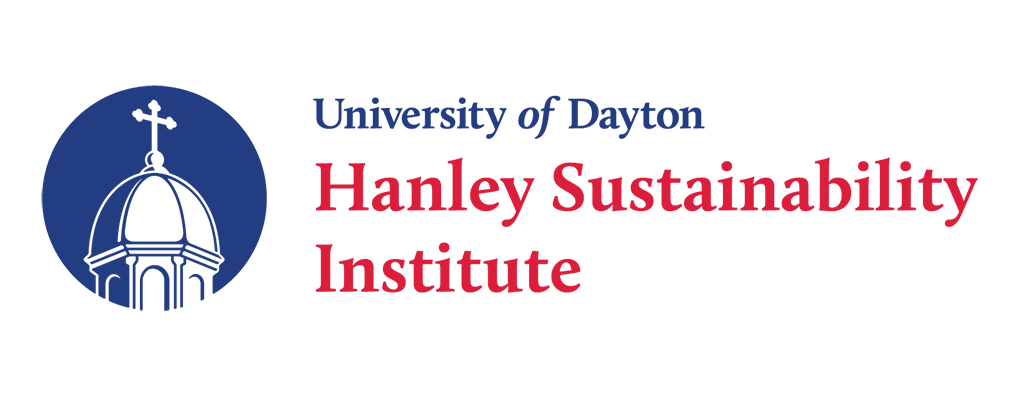Hanley Sustainability Institute

First five Hanley Sustainability Institute graduate fellows have diverse backgrounds
By Mark Gokavi
The University of Dayton’s Hanley Sustainability Institute has named the first five HSI graduate fellowship recipients.
The new program, which will start next academic year, was launched to attract high-quality students with an interest in sustainability to work on research projects mentored by a faculty member and other complementary programmatic efforts within HSI.
The 2021-22 fellows are:
Theresah Adu Ansere, a 2016 graduate of University of Education in Winneba, Ghana, has been teaching English at a high school in Ghana. Before that, she taught English at a Montessori school. “As a professional teacher, my successes have stemmed from essential skills, including my ability to write creatively and communicate effectively,” Ansere wrote in her application. “I have enhanced my collaboration abilities and cultivated a reputation as a major contributor through communication and critical thinking.” Ansere will work with HSI curriculum director and sustainability program director Rebecca Potter on a book project about core competencies in sustainability education.
Grace Attea, a December 2019 graduate of UD with a degree in environmental biology, who worked on various projects for Five Rivers MetroParks and as a post-baccalaureate scientist with biology professor Ryan McEwan. “I quickly realized the importance that the land plays in preserving native biodiversity and in aiding the health of surrounding man-made communities,” Attea wrote in her application. “I am certain that the knowledge and expertise that I have developed will be valuable to this position and to the long-term project goal of using science-based approaches for regional land management.” Attea will continue working with McEwan on a project that will use tree-ring analysis to study the link between forest dynamics and a complex of ecosystem drivers in forests of southwestern Ohio.
Chelcie Barnett, who is finishing her first year at UD’s School of Law. She has a 2014 undergraduate degree in biology and a 2017 master’s degree in environmental health from Colorado State University. After that, she did consulting work before starting law school. “Though my educational background includes biology, epidemiology, and environmental health, I chose to pursue my degree in law because I recognize a vast divide between scientific research and the implementation of effective policies to incorporate research findings into improving the lives of others,” Barnett said in her application. “By gaining understanding of legal and legislative processes, I hope to integrate my legal and scientific backgrounds to bridge the gap and effect true change capable of protecting people from the adverse effects of climate change and environmental injustices.” Barnett will work with Felix Fernando, an assistant professor of sustainability and the coordinator of UD’s graduate certificate program. Fernando’s project will examine the feasibility and practicality of integrative sustainable strategies in the City of Dayton, thereby identifying potential practical action.
MaryEllen Etienne, who has post-graduate studies in environmental science at Miami University and public administration at Wright State University, is pursuing a Master of Interdisciplinary Studies degree from the University of Dayton which intersects both subjects. She works on the market transformation and development team the the U.S. Green Building Council and has been leading sustainability-based programs for two decades. An advocate of zero waste and the circular economy, she is the creator of “Women in Circularity," a monthly feature in Resource Recycling magazine. She is also working with Assistant Professor of Sustainability Felix Fernando to find community based integrative sustainable strategies to address climate change and build resilience. "Much of my work experience has been at the national and regional levels — so I was intrigued by the opportunity to engage in sustainability at the local level, both at the University of Dayton and in the Greater Dayton area," Etienne said. "While I have years of on-the-job training and the practical application of environmental programs, my hope is that a Masters program that combines my passion for sustainability and my interest in the public administration of resilience initiatives, will help take my career to the next level."
Tia Turner, a 2019 Miami University graduate from Beavercreek with a degree in psychology, who is getting her master’s degree at UD in clinical psychology. She currently assists psychology professor Roger Reeb’s behavioral activation project in homeless shelters affiliated with St. Vincent de Paul. “As an advocate for the United Nations call to action for sustainable development, I am elated for an opportunity to apply my unique skill set working at the therapeutic shelter farm to grow nutritious food for people suffering from homelessness in a food desert and create a much-needed therapeutic outdoor space for residents during and following the COVID-19 pandemic,” Turner wrote in her application. Turner will continue to work on Reeb’s project of behavioral activation at a homeless shelter in Dayton providing residents at the homeless shelter with opportunities to engage in productive activities that yield response-contingent reinforcement, which increases their productive behavior, sense of mastery, quality of life, mood and cognition.
For more sustainability news and information, visit HSI’s news blog, the Hanley Sustainability Institute website and the sustainability program website. To sign up for HSI’s Sustainability Spotlight newsletter, register here.
